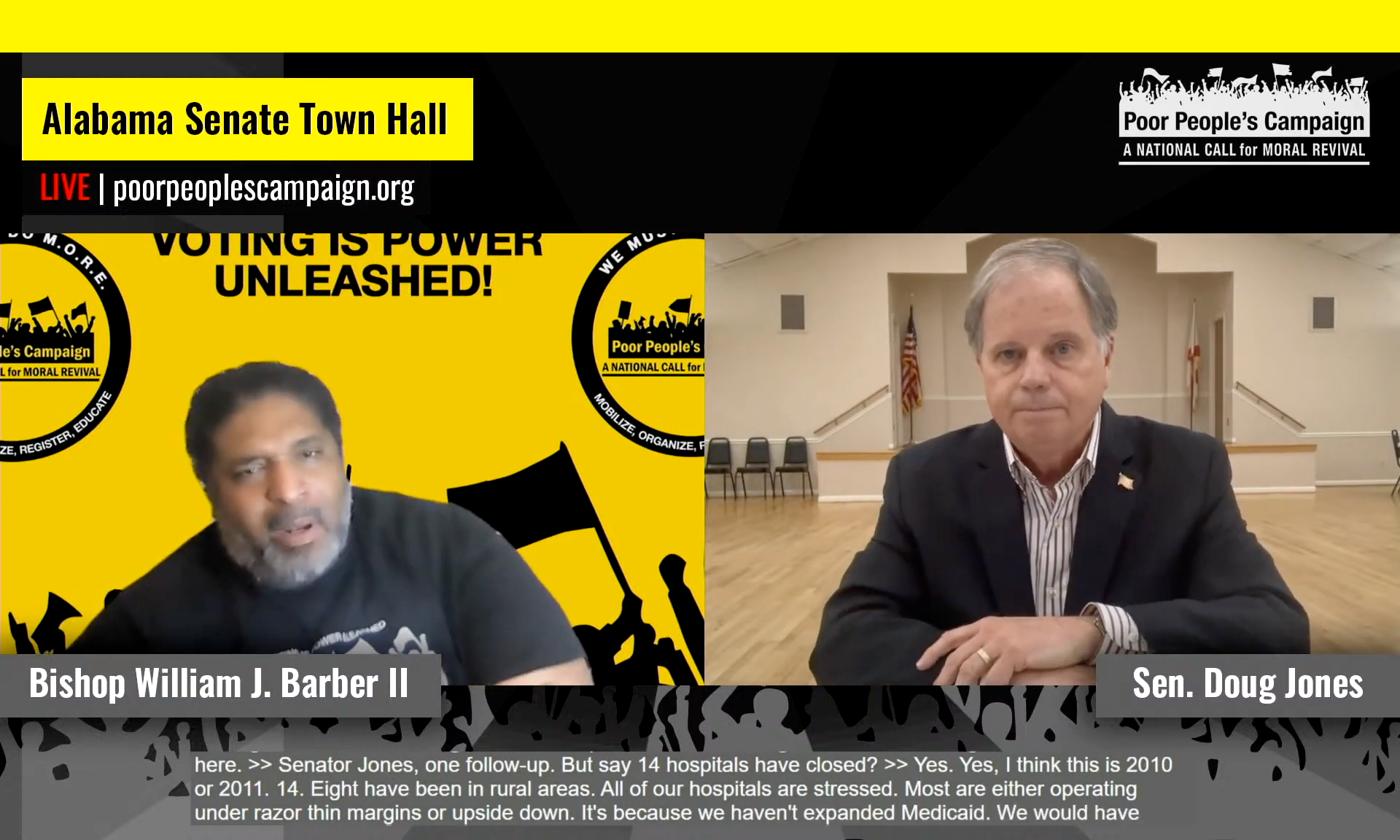Alabama Democratic Sen. Doug Jones, speaking during an online town hall Thursday, said people in Alabama have more in common than they have that divides them.
“Unfortunately, what we have so much in common of is a lack of opportunities, lack of health care, lack of equality in terms of wages, lack of the ability to get broadband,” Jones said during the Poor People’s Campaign Senate town hall.
Inspired by Martin Luther King Jr’s 1968 effort called the Poor People’s Campaign, a group of civil rights leader and impoverished workers and allies aimed at confronting poverty and human rights, today’s Poor People’s Campaign: A National Call for Moral Revival started in 2018 and has chapters in more than 40 states.
“We have so much in common where our educational system fails so many kids. We have so much in common, where we have one of the highest rates of poverty and low wealth of any state in the country,” Jones continued. “Those are not things to be proud of, but those are things to be working toward, and voting to try to change.”
Bishop William Barber II, co-chair of the Poor People’s Campaign, spoke during the town hall of systemic problems of poverty and a lack of access to health care for millions in the U.S. and especially in the South. The COVID-19 pandemic has amplified the suffering for so many, he said.
Barber said the loss of life from COVID-19 in the U.S. “is like suffering the effects of 109 Hurricane Katrinas.”
“Think about that for a while. It’s like enduring the 911 attacks every day for 66 days,” Barber said. “We’ve lost more people from COVID-19 than in five of our most recent wars.”
Tommy Tuberville, Jones’s opponent in the upcoming election, was invited but did not attend Thursday’s town hall. Tuberville has declined to debate Jones, and has largely avoided interviews with journalists from traditional newspapers, opting instead to speak on conservative radio programs.
“Let me say I’m disappointed that my opponent is not here tonight,” Jones said. “But I’m not surprised. He doesn’t have any of these answers. He doesn’t have any plans, and he doesn’t want to talk about these issues. He just wants to hide behind his party affiliation and let it carry the day.”
Jones explained that he’s spent his time in office fighting for the poor and disenfranchised, and had authored or co-signed on numerous bipartisan bills passed to do just that. Jones said he supports protecting Medicaid, Medicare and Social Security, while his opponent wants to make cuts those programs.
Jessica Banks, a 35-year-old mother of two living in Mobile, joined the town hall to ask Jones a question. Banks said she’s lived in extreme poverty for 16 years, has debilitating and painful medical conditions and makes $400 a month.
“In Alabama, in addition to the 2.1 million poor and low income people, there are 483,000 people who lack health insurance. 448,000 make less than $15 per hour,” Banks said. “How is your campaign specifically going to address these issues of poverty inequality, health care and living wages., and how will you challenge the myth of scarcity, that claims there’s not enough for everyone to thrive in our state?”
Jones said he’s worked to address health care disparities, and fought to expand Medicaid in Alabama, which he said would ensure approximately 370,000 of those uninsured Alabamians, since his first day in office.
“And at the same time it literally would have brought in billions of dollars to the state of Alabama,” Jones said.
Jones also discussed his concern over the possibility that the U.S. Supreme Court, with Trump’s selection of Amy Coney Barrett, would destroy the Affordable Care Act.
“Right now in Alabama we’ve got 957,000 people under the age of 65 that’s got a pre-existing condition like yours,” Jones told Banks. “They will all lose their health care.”
Jones was also asked how he defines systemic racism and what policies are in his platform to address it.
Jones said the COVID-19 pandemic has put a spotlight on our inequalities, which he said are based in large part on systemic racism.
“And we know that. This has been what I’ve called a multi-generational failure on the part of folks and authors in our society to address these issues over the years,” Jones said. “Make no mistake. We have come a long way, and no one should deny that. No one should not acknowledge the progress that we’ve made in this country, but no one should also deny the fact that we’ve still got a ways to go.”
Jones described systemic racism as a combination of racism and implicit bias, which impacts minority communities in a myriad of ways, including a lack of access to capital for minority business owner, which he’s worked to address through legislation and discussions with national leaders.
“It’s why I’ve got a bill pending that addresses bias when it comes to maternal health and infant mortality, because we know that Black women die at greater rates,” Jones said.
Jones said he was an early voice supporting of taking down Confederate monuments, but that “doesn’t do any good if we don’t remove the barriers and its little barriers in health care and housing and education or employment.”
“That’s what I’m going to do in my next term as well. I’m going to continue to do what my friend, the late John Lewis said. Stand up. Speak out. Cause a little good trouble and make voices heard.”
Jones encouraged the public to vote in the upcoming election to ensure the needed changes are made.
“I am exhibit A of what can happen when people turn out and vote,” Jones said.





















































